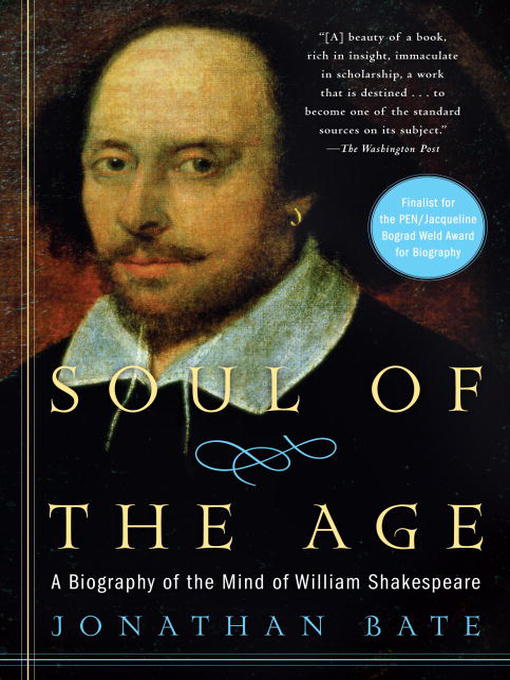
Soul of the Age
A Biography of the Mind of William Shakespeare
کتاب های مرتبط
- اطلاعات
- نقد و بررسی
- دیدگاه کاربران
نقد و بررسی

January 12, 2009
Ben Jonson claimed that Shakespeare “was not of an age, but for all time!” Conversely, noted British Shakespeare scholar Bate (The Genius of Shakespeare
) attempts to prove that the Bard effectively represents the politically and socially complicated 16th-century environment and that his work can then—theoretically—illuminate his mysterious personal life with the notable exception of his marriage. While much is conjectured here, the scant biographical resources are well-used to painstakingly define Shakespeare's careers as actor, poet and playwright and to refute popular myths such as his purported retirement from writing. Bate's approach is more successful in confirming that Shakespeare typifies his age than in providing substantive biographical information based on hints hidden in the prolific body of work. Even so, Bate offers an excellent resource for students of English literature and the Elizabethan era in this thoughtful, well-researched and even playful explication of Shakespeare's plays and sonnets as they resonated in both the Elizabethan sphere and the less austere Stuart court while remaining relevant today. Illus.

Starred review from February 15, 2009
Few have anything new to say about Shakespeare, even fewer the ability to say it in refreshing ways. This exceptional book does both.
Breaking from the traditional biography's unyielding march of chronology, British scholar Bate (Shakespeare and Renaissance Literature/Univ. of Warwick; The Song of the Earth, 2000, etc.) examines the social, political and cultural forces that shaped his subject's mind—he wants to know what it was like being Shakespeare. For his narrative framework, Bate looks to the"All the world's a stage" speech from As You Like It, in which"one man in his time plays many parts / his acts being seven ages": infant, schoolboy, lover, soldier, justice, old man and, lastly,"second childishness and mere oblivion." What could have been an arbitrary, imposed structure instead proves a sturdy formal platform from which Bate freely soars, offering a fresh, colorful and exciting portrait of a man whose portrait has been painted countless times before. Why so much rhetorical argument in Shakespeare's plays? Bate points to the enduring effect of his schoolboy studies of Latin grammar. Why such sympathy for idiots and fools? The playwright felt out of place in London, a country bumpkin amid urban sophisticates. Why was Shakespeare so successful compared to his peers? Perhaps because he lived frugally, invested well and remained devoted to his family, while most of his competitors lived hard and died young. Bate's ability to shuttle back and forth between what he calls"the Shakespearean mind" and what scholar Patrick Cruttwell usefully called"the Shakespearean moment" keeps the pace and content engaging. Occasionally, the author indulges in academic hair-splitting or wastes time criticizing those who doubt William Shakespeare was a real person who wrote his own plays. (Does anyone care about that debate anymore?) More often, though, Bate is generous with his learning, insight and wit, and more than willing to explain thoroughly.
Lucid, rich and erudite—essential for libraries, students and Bardolaters.
(COPYRIGHT (2009) KIRKUS REVIEWS/NIELSEN BUSINESS MEDIA, INC. ALL RIGHTS RESERVED.)

Starred review from March 1, 2009
George Bernard Shaw mused, "Everything we know about Shakespeare can be got into a half-hour sketch," and this is the challenge Bate faces in writing this biography. Shakespeare's writings have survived through the ages, but much about the author has disappeared, so there is little on which to base a biography. Bate's previous work, "The Genius of Shakespeare", was a "traditional" biography, relying upon facts and anecdotes to reconstruct the Bard's life. In this "intellectual" biography, Bate uses Shakespeare's own example of the seven ages of man for structure: survival and environment for the infant; book learning for the schoolboy; the nature of sexual desire for the lover; war and social unrest for the soldier; law and politics for the justice; wisdom and folly for the old man; and the art of facing death for the age of "oblivion." Bate is able to reveal the world in which Shakespeare moved and in the process lend depth to what would otherwise be a two-dimensional rendering of the man himself. This is not only an outstanding scholarly accomplishment but also a pleasure to read. Recommended for all libraries.Mark Alan Williams, Library of Congress
Copyright 2009 Library Journal, LLC Used with permission.

April 1, 2009
Whereas the recent crop of Bard biographies makes quite clear how obscure are the whereabouts of Shakespeares body during lengthy periods of his 52-year life span, Bates fifth Shakespearean book demonstrates that its much easier and no less fascinating to account for the poet-playwrights mind. Using Jaques famous Seven Ages (i.e., life stages) of Man speech in As You Like It to plot the book, Bate runs to ground the sources of the ideas about and the concerns of each age that appear in the plays and poems. Shakespeares education, material circumstances, reading, and political and intellectual context affected him about equally overall, Bate shows, though each more or less greatly depending on the stage of life that was his immediate topic. Seasoned Shakespeareans already will know about how the works of Ovid, Plutarch, and Montaigne affect the poems and plays, but do they know how epicureanly skeptical Shakespeare was and from where that came? A book in which Bardolators may gratefully immerse themselves.(Reprinted with permission of Booklist, copyright 2009, American Library Association.)

























دیدگاه کاربران